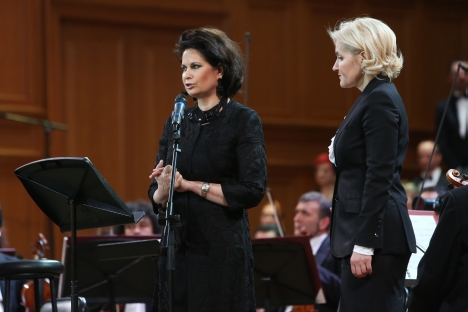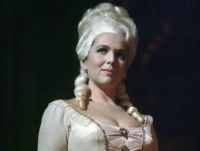Olga Rostropovich in the footsteps of legendary parents

Olga Rostropovich is the artistic director of the The fourth Mstislav Rostropovich International Festival. Source: Ekaterina Chesnokova / RIA Novosti
Rossiyskaya Gazeta (RG): What do you feel about the idea that has been knocking around for a while now – that the festival should be named not only after Rostropovich, but also after Galina Vishnevskaya?
Olga Rostropovich (O.R.): I’m completely against it. My mother always strongly asserted her own separate artistic career as a singer and actress. She didn’t like being referred to as “the spouse” or “the wife.”
She was strongly against my father becoming a conductor at the Bolshoi and she didn’t hide this. The theatre was always her world, where she was indisputably in charge – the prima donna.
My parents had an astonishing artistic and personal partnership, but, within that, each of them had the right to maintain their own image. The music festival is my father’s legacy, while my mother’s is the Opera Competition, and her school. That’s how things should remain.
RG: Very recently you were officially confirmed as the director of the Galina Vishnevskaya Opera Center. Was that something that you had expected?
O.R.: My mother prepared me for this, both morally and professionally. I was at her side constantly for the last five-and-a-half years of her life. She insisted that I went with her to all of her classes and rehearsals with the students. I know exactly what she wanted and what she didn’t.
In addition to that, before she died – when we were at a clinic in Germany – she gave me a valuable audio recording. She told me very clearly, in a way that only she knew how, “Olga, sit down with this, and record it.” I didn't fully understand what she meant by “record” – should I get a notebook and write it all down?
She told me exactly how I ought to live in the future. I started to feel a little queasy: I hadn’t been prepared a conversation like that.
RG: If it’s not a secret, could you tell us what the most important thing in that recording was?
O.R.: The recording contains a lot that’s purely personal, but she said that she wanted me to continue her work after she died. “I don’t want things to be turned into the Sandunovsky Russian Baths when I go.” That’s what she said. There was no question about whether I wanted to or not. I had to do it.
RG: What is your plan of action in your new position?
O.R.: I’ve already engaged some new vocal teachers – some excellent singers including Makvala Kasrashvili, Elena Zaremba and Anatoly Loshak. They welcomed my invitation and have already begun teaching. This is a wonderful opportunity for our students.
The most important thing our center can do is produce top singers. After the bad period we went through, we have to put all our efforts into the teaching process. The rigorous quality of the training was always my mother’s top priority.
Galina Vishnevskaya Opera Centre celebrates its 10th birthday this year with anniversary performances and concerts, special exhibitions, publications and other projects.
May 19-21 – London - Cadogan Hall Gala concert by the soloists of the Opera Centre
Russian Cultural Center in London 'The Pushkin House' - Opera Centre presentation
June 10-17 – Moscow, Saint-Petersburg ‘Young Opera Singers Sessions’. Master-classes and Gala Concerts by the soloists of the opera Centre and Domingo-Thornton Young Artists Program under the LA Opera
June 20 - Tchaikovsky Concert Hall Tribute to Galina Vishnevskaya: Opera Highlights. Conductor - Eugene Kohn (USA)
RG: Will the whole family be coming to the festival?
O.R.: My sister Yelena is coming. Unfortunately my sons, Oleg and Slava, can’t make it because they are studying in the United States.
Slava will be finishing school this year and going to college – it’s a very complex process which involves a lot of responsibility. He’s only got two months of preparation left. He’s has to get his algebra up to scratch to get his high school diploma.
It’s almost shameful for me to think how to help him, considering that my father was an Honorary Doctor at nearly 30 American universities. But things don’t work that way in the United States. The only thing that will get you into college are the grades that you earned in high school. This summer isn’t going to be an easy one for me.
On top of that, my elder son Oleg told me that he’s planning to come over to Moscow to take some Russian language courses.
RG: Do you worry that your sons’ interests aren't connected with music, so far?
O.R: For me, like any mother, the most important thing is that they are healthy, happy and successful in the professions they choose. What worries me is something else – that music isn’t part of their spiritual lives so far.
But well, recently they wanted to go to “La Traviata” at the Metropolitan Opera, and then they had a spirited discussion afterward about what they’d seen and heard – that was a really pleasant surprise for me. It’s a real pity that I don’t get to spend more time with them.
RG: But you and your sister were surely used to frequently spending time away from your parents when you were young?
O.R.: Yes, that’s true. When they were away for long periods, we became very sad and even cried. And we were blissfully happy when they came back again.
Related:
Galina Vishnevskaya, great Russian opera star, dies at 86
The masters who created Russian classical music
Remembering Van Cliburn, the most Russian of American pianists
We used to prepare for their return several days in advance: we made different salads, set the table; we thought up new hairstyles, made sure our hair ribbons were tied just right; and we removed our bad school marks from our report cards. We were busy in every way. We used to check our bags, because we knew that dad might look in them by accident – so any letters from boys had to be thrown away.
Any presents we received had to be deserved. Our lives were very strict. I don’t have the strength to be that strict with my own kids.
RG: Would you say you are more of a daddy’s or a momma’s girl?
O.R.: I’m a daddy’s girl for sure. When I was young, I was very similar to him; I was chubby and wore glasses.
But Lena was always a momma’s girl. She was attractive and elegant. Sometimes I was so envious of her that I cried. But, as we grew up, I don’t know how, but Lena grew more and more like her grandmother – dad’s mom – while my voice and manner of speaking grew like my mother’s.
But I’ve definitely inherited my dad’s character, that’s 100 percent certain. It’s thanks to him that I could play the cello so well and learned the piano. Not like my dad, of course – no way near his level. But I still played both instruments.
RG: You’re now the head of a world-famous musical dynasty. How do you plan to take charge of its heritage? What are the plans, for example, for the house on the Moika River in St. Petersburg or the apartment in Paris?
O.R.: Mother left a will for me and one for Lena, in which everything is clearly indicated. Nothing will be sold off at auction in order to divide the cash. Nor will we be tearing at each other’s hair over pennies, either.
The interview is first published in Russian in Rossiyskaya Gazeta.
All rights reserved by Rossiyskaya Gazeta.
Subscribe
to our newsletter!
Get the week's best stories straight to your inbox
